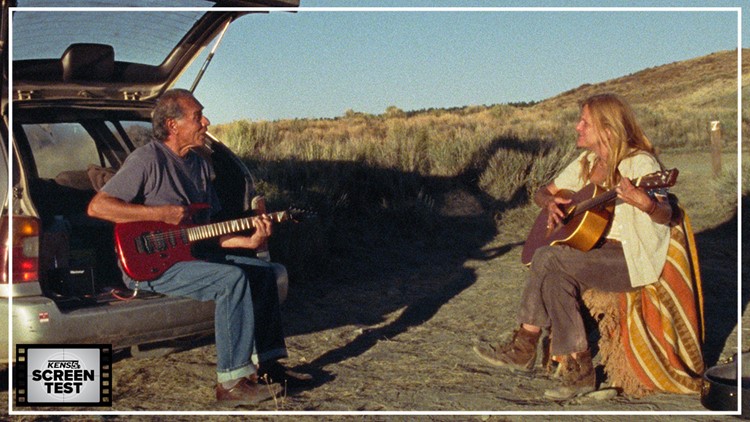TEXAS, USA — “Now, where have I seen her before?” is the first question you’re likely to ask of the delicately constructed acher “A Love Song,” specifically when it comes to the woman at the center of it. This would be Dale Dickey, one of Hollywood’s most reliable character actors, and one able to shift the tectonic plates under her eyes as organically as she shifts into genre modes; recently, that includes the single-location thrills of “No Exit,” the existential quirk of “Palm Springs” and the feel-good buoyancy of Amazon Prime’s new “A League of Their Own” series.
And this would also be Faye, a character with seemingly little concern for whatever bustling world lies beyond the matte-painting-pretty vistas where she fishes for lobster, sips coffee out of a tin cup and salutes the chirping birds every morning. That Dickey resides comfortably outside the boundaries of who’s considered a leading lady at the movies in 2022 means Faye could resemble someone we briefly glanced down the street or at the store before they quickly evaporated from our minds.
But “A Love Song” – the wonderful feature debut for Max Walker-Silverman, who wrote and directed – is less concerned with who has forgotten Faye than who might rediscover her, an optimism underscored with pastel-colored sunsets (captured by cinematographer Alfonso Herrera Salcedo) and the pleasant rhythms of a life that isn’t necessarily ticking towards an end but, rather simply, ticking on. Faye does have some acquaintances in this utopia; she’s on an offer-a-cup-of-joe basis with the mule-riding postman and chips in to help a Wes Andersonian quintet that introduces enough quirk to keep “A Love Song” from keeping its finger pressed on too somber a key (even as they occasionally threaten to lift the movie beyond any conceivable realm of realism).
There’s also, however, a not-so-small touch of Chloé Zhao in the spiritually inclined vastness that seems to stretch out from the tiny trailer Faye has called home for… a few days? Weeks? Months? Walker-Silverman pays little mind to answering such ambiguities. But sure as the sun rises over that picturesque mountain in the distance does the young filmmaker emphasize them, in turn placing Faye at the center of her own universe whose gravitational pull is measured in melancholy.
Where Fern in “Nomadland,” another elderly protagonist the world could afford to ignore, wanders through the American West without looking back, Faye waits—a glint of nervous excitement and girlish smile cracking through when some fellow campers ask her what for, careful not to succumb to hope. The irony, of course, is that Dickey herself has for nearly 30 years bided her own time for a starring role making full use of her ability to shade sadness with bite, hope with restraint, ferocity with anguish.
And if Faye and Dickey’s journeys echo each other, then it is no spoiler to say that the thing – or rather, the person – Faye is waiting for ultimately arrives in the form of Wes Studi’s Lito, a quiet-spoken man bearing flowers, shared memories and uncertainty about what to expect from the reunion. For a time we don’t know what to expect either, and it’s the in-between spaces amid the duo’s gradual opening up to each other that Walker-Silverman most impresses, gently ushering a potency to the stillness and silences that reverberate through his movie’s ostensibly spare construction.
Like the radio Faye insists always plays the right song at whatever moment its dial is turned (a romantic device, and a slightly cheap one too), “A Love Song’s” middle act tends to spontaneously manifest into something intensely dynamic and moving—and also a bit seismic when you consider what Faye and Lito have on the line, anchored by the weight of decades that have passed since they last saw each other.
What “A Love Song” lacks in traditional momentum it makes up for with the texture of entire lives being contemplated, even as they’re not explicitly divulged. A standout scene finds the two tucked into a dinette, testing the ever-shifting limits to their evolved relationship with the delicate candor of two people 50 years younger. Here, especially – but also in the way Walker-Silverman frames his two stars on their low-key excursions – the film comes to be about reconciliation between present and past, expectations and reality, distance and desire. At its most effective, “A Love Song” translates these dichotomies through things felt and not said, so when a fellow camper confides in Faye her doubts about marriage, you can feel the poetry of Walker-Silverman’s screenplay slightly tarnished by its machinery.
And yet the story remains – rightfully, gracefully and lovingly – centered on Faye, and our appreciation in her flourishes as much for her resourcefulness as for the boldness with which she confronts that which was seemingly abandoned long ago. Her character is a reminder of the universality of pondering what was and what might have been; like the constellations she gazes at overhead, things like love, loss and acceptance glow brightly to every soul, if from singular perspectives. Where have we seen Faye before? By the end of “A Love Song,” we realize how far the answer might extend: within ourselves.
"A Love Song" is rated PG for mild thematic elements. It's now screening in San Antonio theaters. Runtime: 1 hour, 21 minutes.
Starring Dale Dickey, Wes Studi, Michelle Wilson, John Way
Written and directed by Max Walker-Silverman
2022
---
MORE REVIEWS:
- 'Spin Me Round' Review: Shapeshifting Italy-set mystery, with a dash of disappointment
- Movie review: 'Beast'
- ‘Emily the Criminal’ Review: Aubrey Plaza is at her most blistering in searing crime drama
- Movie reviews: Brad Pitt's 'Bullet Train,' and a North Texan makes a cameo in 'Easter Sunday'
- 'Prey' Review: 'Predator' prequel sees cinema's deadliest hunter come across a different kind of foe
- ‘Vengeance’ Review: BJ Novak tries hard to say something – maybe several somethings – about Texas
- ‘Resurrection’ Review: Rebecca Hall and Tim Roth propel off-the-rails psychological thriller
- ‘Nope’ Review: Jordan Peele's extraterrestrial thriller blooms from existential roots



